
Related
Guests
- Andrew HackerProfessor of Political Science at Queens College in New York City. He is author of the bestselling book on race, Two Nations : Black and White, Separate, Hostile, Unequal. He is a frequent contributor to the New York Review of Books, where he has been writing since 1965. His latest article is “Obama: The Price of Being Black.”
As we continue on the subject of voter suppression and race, we turn to Queens College political science professor and bestselling author Andrew Hacker. In the latest issue of the New York Review of Books, Hacker writes, “Obstacles to getting blacks to vote have always been formidable, but this year there will be barriers — some new, some long-standing — that previous campaigns have not had to face.” [includes rush transcript]
Transcript
JUAN GONZALEZ: As we continue on the subject of voter suppression and race, we turn to Queens College political science professor Andrew Hacker. He has an article in the latest issue of the New York Review of Books titled “Obama: The Price of Being Black.” In it, he writes, “Obstacles to getting blacks to vote have always been formidable, but this year there will be barriers — some new, some long-standing — that previous campaigns have not had to face.”
AMY GOODMAN: Andrew Hacker is the author of the bestselling book on race, Two Nations: Black and White, Separate, Hostile, Unequal. He is a frequent contributor to the New York Review of Books, where he has been writing since 1965, joining us here in the firehouse studio.
Welcome to Democracy Now! Talk about the voting obstacles. Start to go through the list.
ANDREW HACKER: Alright, let’s take the first. The state of Indiana, several years ago, decided, you know, there’s such a thing as voter fraud — remember Tammany Hall, so — or people voting five different times, that kind of thing. So, therefore, what they said was, we need voter ID. And they decided everybody who came to vote had to show their driver’s license with their photo on it, you know, like at the airport. Well, sounds OK, until you discover that not everybody is a driver.
Well, going to the state of Indiana, which enacted this, I actually went. Believe it or not, here’s your tax dollars at work. The Federal Highway Administration keeps a record of how many adult residents of every state has a driver’s license. And, by the way, the court didn’t even look at this. And I discovered that in Indiana, 14 percent of adult residents do not have driver’s license. That’s one-in-seven. Now, this means they can’t vote, unless you go to a Bureau of Motor Vehicles office, which in Indiana could be miles away, and fill out a long form to get a non-driver’s license. Well, not many people are going to do that, and in particular, not that many black voters are. Many of them are older; they’re poorer.
And, in effect, what — not “in effect,” really, what this Indiana law has is what we call disparate impact. It means it doesn’t say this is to keep blacks from voting, but it has the greater impact on black voters. The case went all the way up to the Supreme Court, and by a vote of six-to-three the Indiana law was allowed to stay in place.
AMY GOODMAN: You raise an interesting point in the article. You say that the lawyer who argued before the Supreme Court, when asked about the numbers of people who don’t have driver’s license, kept saying this word 43,000, inexplicably. When you looked at it, you said 673,926 adult residents of Indiana have no license.
ANDREW HACKER: Yes, this really astounded me. You’d think that a lawyer for — you know, on a Supreme Court case would do some research on this. But what troubled me was two justices — Stevens, whom we know, and Kennedy — actually voted to sustain Indiana. I think if this 600,000 figure had been used, they might have thought twice about this.
JUAN GONZALEZ: And the other obstacles?
ANDREW HACKER: Alright, the other obstacle is the one that Jefferson Morley mentioned, but on a broader scale. Here, we go to the state of Florida, which is the state you’ll always find when you’re looking about voting problems. Under the Help America to Vote Act, very amiably titled statute, the states are now encouraged to rationalize the voting rolls. I prefer the term “purge,” a bit like “laxative.”
What they do — did in Florida was they sent out a letter to everybody, not just home foreclosures, everyone on the voting rolls, to say, in effect, hey, is your letter going to be delivered? Why? A lot of people have died, left the state. One understands this. But a tremendous number came back, very disproportionately from minorities — black, Hispanic poorer people. Why? Because particularly in the cities, black families are more likely to move. And, by the way, if you move, you don’t think to call the voting board and tell them, “I’ve got a new address.” So, all of those people, when they showed up to vote, you look on the list, you’re not here anymore, you know, and they’re going to have real problems. It’s a bit like getting your credit rating restored.
AMY GOODMAN: Professor Hacker, on that issue of the drivers licenses, you go well beyond Indiana. You look at Louisiana. You look at Milwaukee alone. Talk about who has drivers licenses, who has the official ID, and who doesn’t.
ANDREW HACKER: Yes, in the state of — in Milwaukee, just which has a large black population, over half the black residents do not have drivers licenses. You know, those of us who live in Manhattan know that you — many people in Manhattan don’t have a car, but Milwaukee is a kind of, you know, semi-suburban area. They just don’t have them. And they can’t vote. Well, once this, by the way, steps —-
AMY GOODMAN: And that’s compared with 15 percent of white adults.
ANDREW HACKER: That’s right. 15 percent of white adults don’t have licenses in -— that’s in the rest of the state of Wisconsin. In Milwaukee, over half.
JUAN GONZALEZ: Now, I’d like to ask you about this issue of the disparate impact, because this question of trying to control or limit the rolls, the voter rolls, is not new in American history. Obviously, the progressive reform movement in the early twentieth century attempted to have municipal reform to prevent immigrant voters, who were then basically the base of the Democratic Party machines in different cities. So there have been battles back and forth throughout American history between those who want to control the size of the electorate and those who want to expand it. So, to what degree do you see this as more racially motivated or more class-based? It’s usually that the poorer sectors of the population are the ones that are being attempted to be restricted.
ANDREW HACKER: Well, of course it’s class-based. The poorer you are, whether you’re white or Asian or whatever race, the less likely you are to have, let’s say, a settled address or a driver’s license. That, we understand. Once again, we get to this disparate impact. And therefore, when I hear, yes, it’s poor people, but then I go and look at the racial, if you like, complexion that’s here. Now, you don’t have your race on a driver’s license, but there’s been research, particularly, as Amy pointed out, in the state of Wisconsin in Milwaukee, to actually find out, in racial terms, how many people have licenses. That required doing more than just looking at names on licenses — well, just names, yes.
AMY GOODMAN: Talk about the effect in 2002 of the Help America Vote Act, HAVA.
ANDREW HACKER: Alright. The Help America Vote Act was, in many ways, a response to Florida: no more dimpled chads, no more butterfly ballots. We understand that. But here we live in the twenty-first century, and there’s this tendency to rationalize, you know, make the system rational. And they felt that voter rolls, registrations, were messy, cluttered with dead people, people who have moved around. Let’s clean them up. And you say, hey, that sounds pretty good. Well, you get this question of mail that’s returned.
But then there was another thing that they did in Florida. They decided, because when you register, you have to give your Social Security number, they would check your registration Social Security number that you gave with, people say, Washington, or actually the headquarters of Social Security is in Baltimore. They checked in Baltimore, and Baltimore sent back printout: No, we don’t have this person. In fact, 28 percent of the inquiries made to Social Security kicks back: We don’t know this person. You know, this happens with immigrant workers, too. And one reason could be somebody got married, changed their name, got divorced, took back their name. In some families, you actually can have two different names. So —- but if you didn’t pass the Social Security test, off the rolls also in Florida.
JUAN GONZALEZ: You also talk about the whole issue of removing the right to vote for convicted felons and its impact, as well. Could -—
ANDREW HACKER: Juan, could I just backtrack for a minute about the Florida thing?
JUAN GONZALEZ: Sure, mm-hmm.
ANDREW HACKER: Like the Indiana case, which went to the Supreme Court and Indiana, the state, was sustained, so too the Florida business of purging the rolls went to the federal courts. The district court, lower level, said, no, Florida had to get rid of this, it had disparate income. It went up to the appeals court, where, two-to-one, two Republican appointed judges sustained the Florida rule on purging — rules on purging. And there was a, I thought excellent dissent by a woman justice, Judge Barkett, one who pointed out that this was really — the Florida one — going to affect black voters more than others, but she didn’t get through.
AMY GOODMAN: She noted, while black voters made up 13 percent of the scanned pool, they comprised 26 percent of those who were purged; while whites were 66 percent of the pool, they were only 17 percent of the rejected pool.
ANDREW HACKER: Yeah, that’s what we mean by disparate impact. I mean, but the two judges, the two on the appeals court who sustained it, didn’t even look at that. They didn’t want to. It’s kind of — they’re saying we’re colorblind, kind of thing.
JUAN GONZALEZ: And the situation with convicted felons?
ANDREW HACKER: OK. As everybody who follows this program knows, the United States has more people behind bars than any other country in the world proportionate to population. Russia used to be ahead of us. No longer. We have over two million people behind bars and even more on probation and parole. Now, obviously — and, by the way, black Americans constitute the largest single group behind prison. Six times as many black Americans, mainly young men, are incarcerated compared with whites, six times as many, and over twice as many compared with Hispanics. So, this is a huge group which can’t even vote.
Only in two states, Vermont and Maine, can you actually vote while you’re in prison. By the way, Canada allows that. So does Israel. But only two states. The other states vary. In some cases, you can vote as soon as you walk out, but that’s not most of them. In the largest single number, you have to wait for probation or parole, which can be four years, then you can vote. But, most depressing, there are states where you lose your vote entirely if you’ve served time or been convicted as a felon.
For example, in the state of Virginia, if you want to get back on the voting rolls — I called up — on the website, they have a form you fill out, and you have to get references from three people to get your vote back. You have to send what appears to be a personal letter to the governor: “Dear Governor, this is why I feel I’m entitled to vote again.” Well, you can imagine how many people pass that test. Not many. So we have a lot of Americans, disproportionately black, who are going to be voteless for life.
AMY GOODMAN: You know, what’s interesting about the different laws in every state around whether a felon can vote is the effect it has on states where actually you can vote, but you may not know that. And so, while not the majority of — the majority of states actually allow people who have served time, who have committed felonies, to vote, they think that they can’t.
ANDREW HACKER: They think that they can’t, and it’s a huge bureaucratic labyrinth on this. And in one state at least, they have a list of people who, no matter what, will never be able to vote. One is violent carjacking. Alright. Another is possessing child pornography. And a third is treason. You know, the state —-
AMY GOODMAN: Alabama.
ANDREW HACKER: Alabama. Now, I guess that’s treason against Alabama. Now, what I’d say is, my view is, if you’ve served your time, that’s it. But not in Alabama.
AMY GOODMAN: You have an interesting figure in Mississippi. You say, with 155,127 men and women released between 1992 and 2004, only 107 petitions to have the right to vote restored were approved. Out of over 155,000 people who served time in jail, 107 petitions. The disenfranchisement of former felons in Kentucky has reduced its potential black electorate by 24 percent, by a quarter.
ANDREW HACKER: Yes. There’s been a lot of excellent research done on this. I drew on the Brennan Center at NYU, which really goes into this, and they have -— came up with figures like that, which they’ve really reliably researched and I felt safe in using. Yes. And all of the states will now say, except for treason and child pornography, anyone can apply, but they make it so difficult. For example, in one state — I don’t remember what now — the board that considers your application meets only three times a year. You know, that kind of thing.
JUAN GONZALEZ: And in many of these states, especially the Southern states, these felon laws were adopted in the period after Reconstruction — right? — as they were trying to reestablish the Jim Crow system throughout the South. So, in that sense, it was much more directly racially oriented, the codes that were established to drive blacks off the rolls.
ANDREW HACKER: Absolutely. And as we also know, those states then instituted the poll tax, which, hey, wasn’t that much money, but people were really poor. And the driver’s license rule is much like the poll tax, because it means you have to spend time and money going to the bureau to get your get-out-of — well, get-to-the-polls card.
AMY GOODMAN: We’re talking to Professor Andrew Hacker. He has written the well-known book Two Nations: Black and White, Separate, Hostile, Unequal, has a very interesting piece in the New York Review of Books on obstacles to voting and particularly looking at African Americans. You also talk about how legislation is used. For example, the anti-affirmative action referenda around the country.
ANDREW HACKER: Right. This year, two states — Colorado, which is an important state, and Oklahoma, but you never know — those two states will have on the ballot what’s called “civil rights initiative.” I’m sure all — everyone who follows this program knows the name Ward Connerly. This gentleman who’s based in California has a mission to go to every state in the Union and put repeal of affirmative action on a statewide ballot. He succeeded already in California, in the state of Washington and in Michigan, where, when they’re on the ballot, affirmative action was repealed. You know, for all the Supreme Court decision, the University of Michigan can’t use affirmative action anymore.
Now, I looked into this. Took a bit of digging. In those three states I mentioned, which are fairly liberal states, over 60 percent of the white voters voted to repeal affirmative action. And in a sense, what Connerly was asking them to say is, “Look, my white civil rights are being violated by affirmative action. I’m not getting this place at the university or law school or whatever.” And therefore they voted that way, to repeal. And now it’s up in two more states. I will certainly predict that affirmative action will be repealed in those two states. It’s a certainty. Why? Because white voters, given the chance, when the ballot booth curtains are closed, are going to vote against it. Whether that will affect the presidential vote is an interesting question.
JUAN GONZALEZ: And because the voter could go in and vote against affirmative action, but still it doesn’t necessarily mean whether they’re going to vote Democratic or Republican for president.
ANDREW HACKER: It’s interesting. In the state of Michigan two years ago, and back when the state of Washington had it on the ballot, there were two senators running, Democratic senators, Patty Murray and Debbie Stabenow, Democrats, and actually, even though affirmative action was repealed, they got — the two women got strong majorities and returned to the Senate. So — for Stabenow, it was the first time. So, apparently, voters are willing — forgive me, to psychobabble — to compartmentalize: they’ll vote one way affirmative action, but if they want a Democratic senator, they’ll vote for her, too.
AMY GOODMAN: You write you’ve been careful not to use the word “racism.”
ANDREW HACKER: OK, Amy. I — the book of mine that you mentioned came out quite a few years ago. And I have been doing a lot of writing on race. I’ve lectured, oh, at a hundred colleges, at least. And I’ve discovered that if I, in, say, speaking, use the word “racism” or “racist,” those two six-letter words, the whites in the audience freeze. They don’t want to hear that word. “It’s not me. I respect Colin Powell. I love Oprah Winfrey. I admire Tiger Woods. I’ve got black friends.” You know, all that sort of thing. So, I’ve discovered — maybe it’s a strategic matter — never to use the word “racist,” because I can’t get across what I want to.
Now, between you and me and a couple of million other people, racism, of course, exists — we know that — and in all sorts of ways. And it’s going to have an effect in the current election. But I’m not using the word. So here I am using it, saying I’m not using it.
JUAN GONZALEZ: And you get into that in the article, the impact on the race itself, in terms of how voters view whether they will vote for an African American candidate or not.
ANDREW HACKER: Yeah, this is very tricky, because if you ask people, whether it’s in a poll or interviewing men or women in the street, they’ll say, “Oh, if I’m opposed to Obama, race has nothing to do with it.” You know, they may talk about his policies, they may talk about his lack of experience, or even, if they want to, they’ll say, “He looks to me like an intellectual snob,” which, by the way, is a nice white term. How often do you hear that blacks are called intellectuals? Anyway, so they’ll use non-racial reasons.
But the more we look at voting returns, we more discover that people don’t exactly tell the truth when they’re asked about race in elections. I won’t go into the details, but there’s something called the “Bradley Effect,” which, as I look at the numbers, I’d say that generally — sounds a bit strange — when a black and a white candidate are running against each other, as happens occasionally, and certainly it’s happening right now, seven percent of the whites will say, “I’m voting for the black person,” and they’re not really going to. They’re not telling the truth. And I’m really bemused by this. Who are they saying this to? A white poller, whom they don’t know, will never see again? They’re still lying. Or an exit poll? They’re lying. And I wonder, you know, what’s going on, because they just voted for the white candidate, but they say they didn’t.
AMY GOODMAN: On that note, I want to thank you very much, Andrew Hacker, for being with us. His piece in the New York Review of Books is called “Obama: The Price of Being Black,” restoring the right to vote.

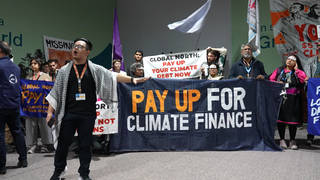
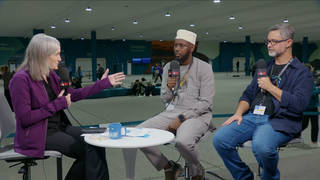
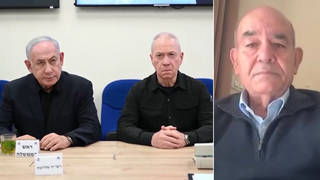
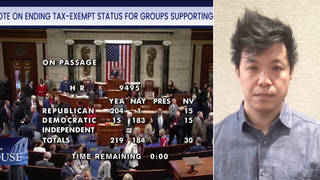





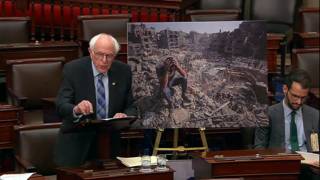

Media Options